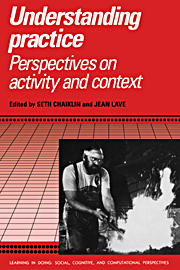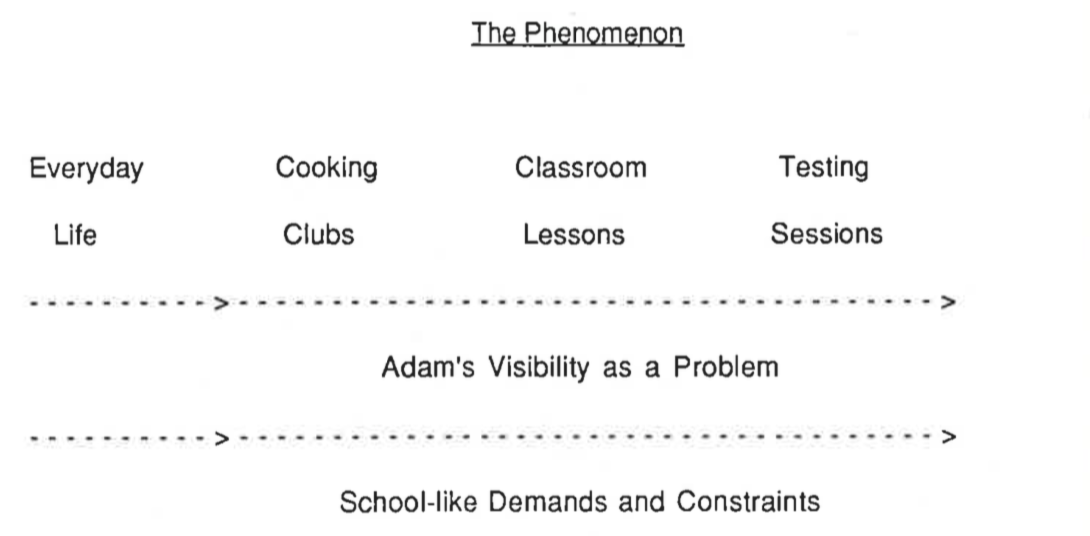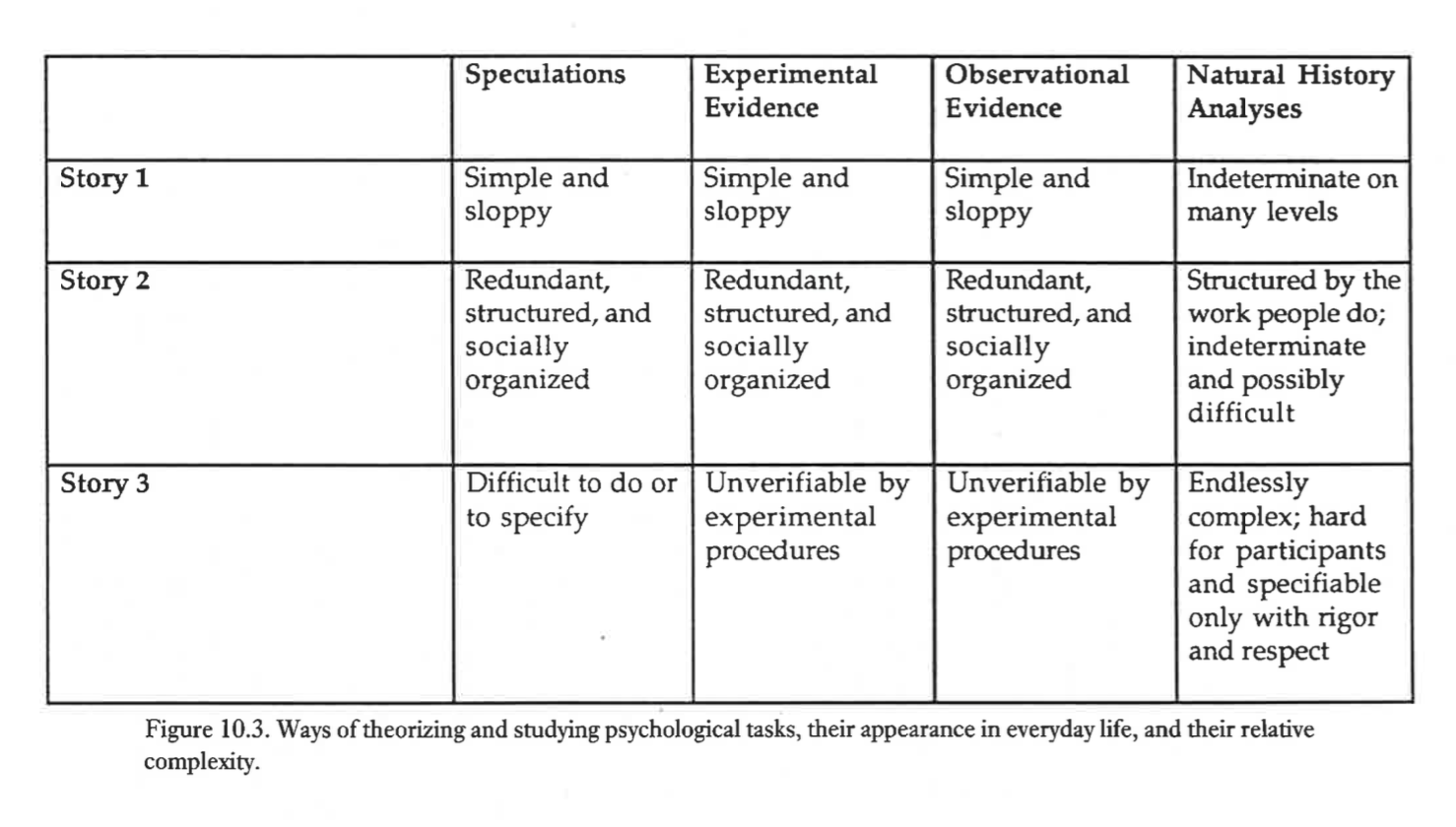
Experimental cognitive psychology did not analyze individuals ‘in the wild’
“Experimental cognitive psychology, we concluded, was condemned to a life of ecological invalidity; there was no systematic way of reasoning from experimental results to a description of individuals living out their institutional lives together (Cole, Hood, & Mc- Dermott, 1978). ” McDerrnott, R., 1993, p. 270
Learning Disabilities are not a description of the individual, it is a label created by the system that fails the learner
“A fiber cannot make a rope, and the very existence of a rope arranges for the fibers to disappear as units of analysis.a Adam is a fiber, which, when joined by other fibers, helps to make the rope, or in this case the category LD, into the unit of analysis. ” McDerrnott, R., 1993, p. 274
“It is in this sense that LD is a context that acquires children.” McDerrnott, R., 1993, p. 275
“All parts of the system define all the other parts of the system. Without the background, there are neither ropes nor fibers.” McDerrnott, R., 1993, p. 275
Legitimate Peripheral Participation of Knowledge
“What I am concerned with are the conditions that maintain the contact in which the information not yet stored in specific instructions moves into the system and becomes a part ofit so that “learning” can take place.” Birdwhistell (in McDermott, 1980) p.16
Knowledge is something external to us and that acquires us opportunities for learning
“Learning is not an individual possession” McDerrnott, R., 1993, p. 277
“It probably makes more sense to talk about how learning acquires people more than it makes sense to talk about how people acquire learning.” McDerrnott, R., 1993, p. 277
“If we can stop focusing on who learns more or less of particular, culturally well-defined fragments of knowledge, and ask questions instead about what is around to be learned, in what circumstances, and to what end, learning achievements would become statements about the points of contact available to persons in various social settings (Lave, 1988a, b). ” McDerrnott, R., 1993, p. 277

An individual must be analyzed in various contexts to enable a true description:
“Text and context, soup and bowl, fiber and rope, Adam and the various learning scenes, all can be analytically separated and studied on their own without doing violence to the complexity of their situation. A static sense of context delivers a stable world.” McDerrnott, R., 1993, p. 282
The Deficit Theory – banking model of education:
“The deficit theory assumes that language and culture are storehouses from which children acquire their competence. Some children get more and some get less. The are assertions about which we should be most uncomfortable” McDerrnott, R., 1993, p. 282
Tests are unrealistic procedures that evidence apparent ignorance:
“What else is a test but an occasion on which you cannot use any of the resources normally available for solving some problem; memory notes or helping friends are now called cheating.” McDerrnott, R., 1993, p. 284
“At the very least, cross-cultural psychology had been extraordinarily clear in showing how various kinds of smartness could be reduced to apparent ignorance in the face of culturally arbitrary and cross-culturally foolish tasks (Cole & Means, 1981).” McDerrnott, R., 1993, p. 284
Spotlight is placed on poor performers, that reinforce their condition. As a defense mechanism, they avoid exposure at all costs – and this is a cognitively demanding task which then prevents them from engaging.
“Classroom Lessons, for example, can be so well organized for putting the spotlight on those who are doing less well than the others that hiding becomes a sensible stratery for all of the kids some of the time and for some of the kids all the time.” McDerrnott, R., 1993, p. 287
“Culture is a sine qua non of disability.” McDerrnott, R., 1993, p. 289
“Looking for Adam’s LD has become something of a sport in Adam’s class, a subset of the wider sport of finding each other not knowing things.” McDerrnott, R., 1993, p. 291
“LD is distributed across persons, across the moment, as part of the contextual work members do in the different scenes. Neither Adam, nor his disability, can be separated from the contexts in which they emerge.” McDerrnott, R., 1993, p. 291
Learning is what happens in the interaction of people
“By the degradation approach, learning is not in heads, but in the relations between people.” McDerrnott, R., 1993, p. 292
“Learning does not belong to individual persons, but to the various conversations of which they are a part.” McDerrnott, R., 1993, p. 292
“Similarly, language and culture are no longer scripts to be acquired, as much as they are conversations in which people can participate.” McDerrnott, R., 1993, p. 295
Failing is just another accepted outcome and acquires individuals.
“He had achieved school failure. Adam had been acquired by the language of LD that was in place before he was born.” McDerrnott, R., 1993, p. 293
“Mothers acquire their children. Languages acquire their speakers. So disabilities acquire their learners. Who is there first? Long before Adam was born, we had LD – or an equivalent: strethosymbolia, for example, or just plain stupidity. [t is an absence we know how to look for.” McDerrnott, R., 1993, p. 294
“There is never a question of whether everyone is going to succeed or fail, only of who is going to fail. Because everyone cannot do better than everyone else, failure is an absence real as presence, and it acquires its share ofthe children.” McDerrnott, R., 1993, p. 295
The problem of ecological validityTests are more cognitively demanding than real life, which provides us all with scaffolds and redundancy.
“Throughout psychology, we found a strong bias that everyday-life thinking is an impoverished version of what can be elicited in special and more demanding settings such as tests and experiments. This makes great common sense, but leaves unspecified just how tests and experiments demand more mental steps of us or just how everyday life can proceed without logical precision.” McDerrnott, R., 1993, p. 296
“Individual thinkers can be sloppy, but the world will carry them. In experimental settings, they have less support, and their thinking processes become both more efficient and more visible.” McDerrnott, R., 1993, p. 296

Story 1: Everyday life is sloppy and easy. Educational professionals know better
Story 2: Everyday life is complex but well organized. Educational professionals understand how to make the most of an environment.
Stroy 3: Everyday life in an adventure. The people know more than we can yet imagine about what they are doing.
“By this standard, most contemporary psychology is invalid. Experimental methods can only document variation in what people cannot do in relation to supposedly well-defined, frozen tasks.” McDerrnott, R., 1993, p. 300